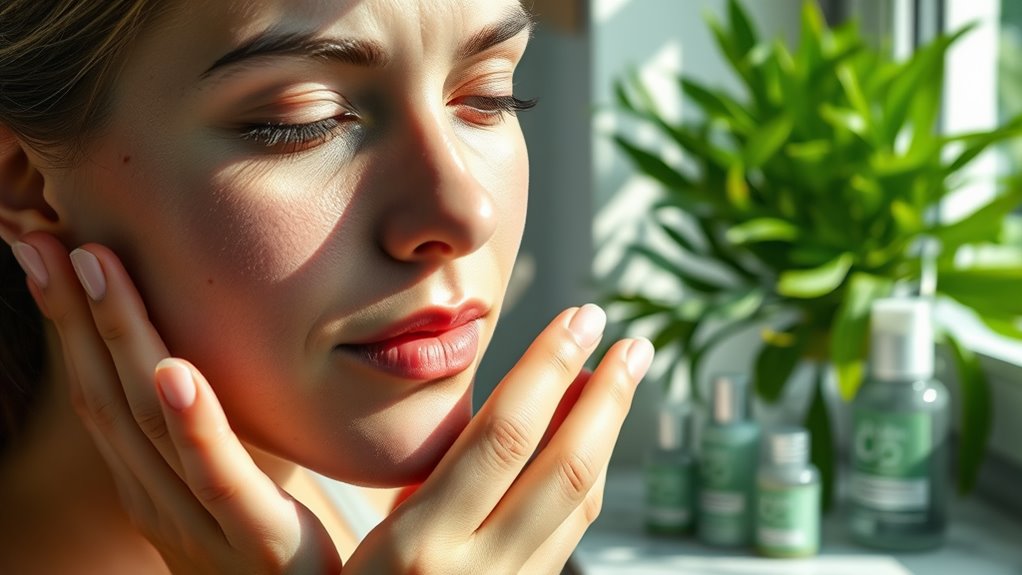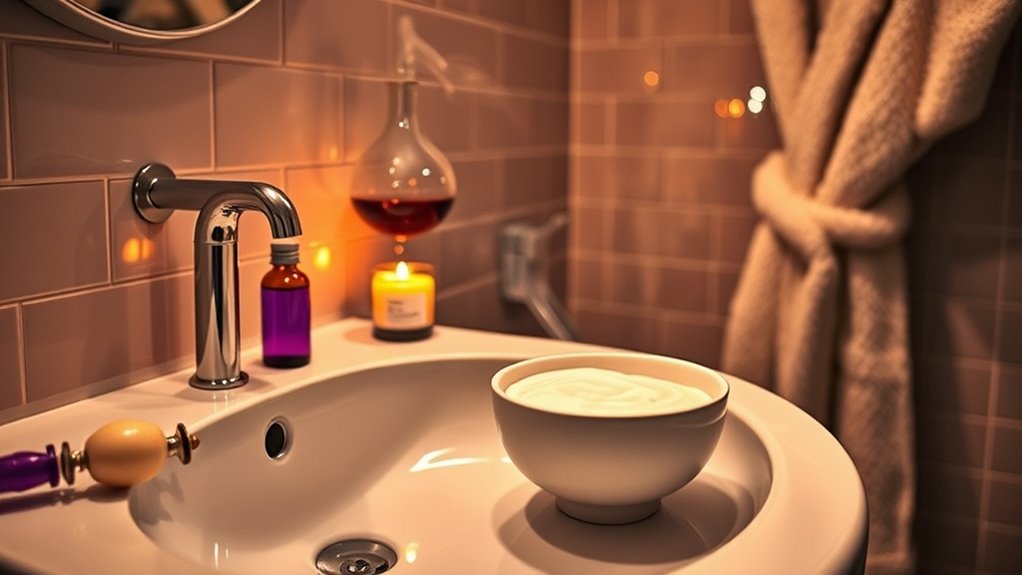Stress Was Ruining My Skin – Here’s How I Took Control
Stress harms your skin by disrupting its barrier, leading to issues like dryness, irritation, and breakouts. Elevated cortisol levels can cause inflammation and increase oil production, intensifying acne. To regain control, identify stress triggers and practice stress-reduction techniques like mindfulness and regular exercise. Additionally, maintain a healthy diet and stay hydrated to support skin health. Implementing a consistent skincare routine can combat the visible effects of stress. Discover effective strategies to enhance your skin’s radiance and resilience.
Understanding the Connection Between Stress and Skin Health
How does stress really affect your skin?
Stress triggers the release of cortisol, a hormone that can disrupt your skin’s natural barrier, leading to dehydration and inflammation.
This deteriorates your skin’s beauty, causing issues like dryness and irritation.
Furthermore, stress negatively impacts your mental health, which can drive you to neglect skincare routines or resort to unhealthy habits.
The connection between stress and skin health is undeniable; when you’re stressed, your skin reflects your internal turmoil.
Prioritizing stress management not only enhances your mental well-being but also fosters healthier, more radiant skin. Effective strategies for stress management include practicing mindfulness and relaxation techniques to help mitigate these adverse effects.
Taking control is essential for your overall beauty.
Common Skin Issues Linked to Stress
What skin issues can stress really cause?
Stress triggers the release of cortisol, leading to various skin problems.
You might experience acne breakouts due to increased oil production, while stress can exacerbate conditions like eczema and psoriasis, causing inflammation and irritation.
Additionally, you may notice increased sensitivity and redness, as stress weakens your skin’s barrier function.
Dark circles or puffiness around your eyes can also arise from sleep disturbances linked to stress.
Lastly, stress can result in premature aging, leading to fine lines and a dull complexion. Recognizing these issues is crucial for managing your skin’s health effectively. Furthermore, prioritizing stress relief can lead to remarkable improvements in both skin health and overall well-being.
Identifying Your Stress Triggers
When trying to manage stress-related skin issues, understanding your personal stress triggers is essential.
Start by keeping a journal to note your daily experiences and emotional responses.
Pay attention to situations that heighten your anxiety, such as work deadlines or interpersonal conflicts.
Identifying physical symptoms like increased heart rate or tension can also help you connect stress to your skin’s reaction.
Additionally, assess your lifestyle habits, including sleep patterns and diet, as these can influence your stress levels. Incorporating simple breathing techniques can also serve as an effective way to reduce stress and improve overall well-being.
Implementing Stress-Reduction Techniques
To effectively manage stress and its impact on your skin, you can implement several techniques that promote relaxation and well-being. Mindfulness meditation practices, regular physical activity, and balanced nutrition choices are proven methods that contribute not only to mental health but also to skin vitality. Integrating these strategies into your daily routine can significantly reduce stress levels and enhance your skin’s resilience. Incorporating mindfulness practices into your beauty routine can further elevate your skin’s appearance and overall health.
Mindfulness Meditation Practices
How can mindfulness meditation practices effectively reduce stress and improve skin health? By fostering a state of relaxation, these techniques lower cortisol levels, which can minimize stress-induced skin issues. Regular mindfulness meditation enhances self-awareness, leading to healthier lifestyle choices that positively affect your skin.
| Technique | Benefits |
|---|---|
| Deep Breathing | Reduces tension |
| Body Scan | Increases body awareness |
| Guided Imagery | Promotes relaxation |
| Loving-Kindness | Enhances emotional well-being |
Incorporating these practices into your routine can significantly contribute to both your mental and skin health.
Physical Activity Benefits
Engaging in regular physical activity offers numerous benefits that can significantly reduce stress and improve skin health. Exercise stimulates the release of endorphins, which act as natural mood lifters.
Increased blood circulation enhances oxygen and nutrient delivery to your skin, promoting a healthier appearance. Additionally, physical activity reduces cortisol levels, a hormone linked to stress and skin issues like acne and eczema.
Balanced Nutrition Choices
A balanced diet plays a crucial role in managing stress and promoting healthy skin. Incorporating a variety of nutrient-rich foods can stabilize your mood and improve your skin’s resilience.
Focus on whole grains, lean proteins, and healthy fats, which provide essential amino acids, vitamins, and minerals. Antioxidant-rich fruits and vegetables help combat oxidative stress, while omega-3 fatty acids reduce inflammation.
Staying hydrated is equally important; water helps maintain skin elasticity and flush out toxins.
The Role of a Healthy Diet in Skin Care
A healthy diet plays a crucial role in maintaining skin health.
By incorporating nutrient-rich foods and staying properly hydrated, you can significantly improve your skin’s appearance and resilience.
Understanding how specific vitamins and minerals affect your skin can empower you to make informed dietary choices for better skin care. Additionally, hydration for skin health through practices like a water detox routine can further enhance your skin’s glow and clarity.
Nutrient-Rich Foods
How can the foods you eat influence the health of your skin?
Nutrient-rich foods play a crucial role in maintaining skin vitality.
Antioxidants, found in fruits and vegetables, combat oxidative stress, reducing signs of aging.
Omega-3 fatty acids, present in fatty fish and flaxseeds, help maintain skin barrier function and hydration.
Vitamins A, C, and E are essential for skin repair and protection, while zinc supports healing and reduces inflammation.
Incorporating colorful produce, lean proteins, and healthy fats into your diet provides your skin with the necessary nutrients it needs to thrive, ultimately leading to a clearer and more radiant complexion.
Hydration and Skin Health
What’s the link between hydration and skin health? Proper hydration is crucial for maintaining skin elasticity, preventing dryness, and promoting a radiant complexion. When you’re well-hydrated, your skin can better regulate oil production and heal from stress-induced damage.
| Hydration Source | Benefits |
|---|---|
| Water | Maintains skin moisture |
| Fruits and Vegetables | Provides vitamins and minerals |
| Herbal Teas | Reduces inflammation |
| Healthy Fats | Supports skin barrier function |
Incorporating these hydration sources into your diet can significantly enhance your skin’s appearance and resilience against stress.
The Importance of Hydration for Skin Health
Why is hydration crucial for maintaining healthy skin?
Proper hydration helps maintain your skin’s elasticity and barrier function, preventing dryness and irritation.
When you’re adequately hydrated, your skin retains moisture, which can reduce the appearance of fine lines and wrinkles.
Additionally, water aids in the elimination of toxins, promoting a clearer complexion.
Dehydrated skin can lead to increased oil production, causing breakouts.
Furthermore, hydration supports the delivery of essential nutrients to skin cells, enhancing overall vitality. Moreover, maintaining optimal hydration levels can unlock radiant skin through the power of hydration, creating a glowing and healthy appearance.
Skincare Routines to Combat Stress Effects
Maintaining proper hydration sets the foundation for an effective skincare routine, especially when tackling the adverse effects of stress on your skin.
Start with a gentle cleanser to remove impurities without stripping moisture. Follow with a hydrating toner containing ingredients like hyaluronic acid to boost moisture retention. Apply a serum rich in antioxidants to combat oxidative stress and protect skin cells.
A lightweight moisturizer will lock in hydration, while a broad-spectrum sunscreen shields against UV damage. Finally, consider incorporating calming ingredients like chamomile or lavender to reduce inflammation, helping your skin recover from stress more effectively. Regular massage has also been shown to enhance circulation, promoting a healthier appearance.
Consistency is key for lasting results.
Seeking Professional Help When Needed
Have you noticed persistent skin issues that seem to worsen despite your best efforts? If so, seeking professional help might be your next step.
Dermatologists can diagnose underlying conditions, such as eczema or acne, that may stem from stress.
They can recommend tailored treatment plans, including prescription medications or advanced therapies.
Additionally, mental health professionals can address the psychological aspects of stress that affect your skin.
Don’t hesitate to consult a specialist; early intervention often leads to better outcomes.





